- Home
- Vasily Grossman
Stalingrad
Stalingrad Read online
VASILY SEMYONOVICH GROSSMAN (1905–1964) was born into a Jewish family in Berdichev, Ukraine. In 1934 he published both “In the Town of Berdichev”—a short story that won him immediate acclaim—and the novel Glyukauf, about Donbass miners. During the Second World War, he worked as a reporter for the army newspaper Red Star; his vivid yet sober “The Hell of Treblinka” (1944), one of the first articles in any language about a Nazi death camp, was used as testimony in the Nuremberg trials. Stalingrad was published to great acclaim in 1952 and then fiercely attacked. A new wave of purges was about to begin; but for Stalin’s death in 1953, Grossman would likely have been arrested. During the next few years Grossman, while enjoying public success, worked on his two masterpieces: Life and Fate and Everything Flows. The KGB confiscated the manuscript of Life and Fate in February 1961. Grossman was able, however, to continue working on Everything Flows, a novel even more critical of Soviet society than Life and Fate, until his last days. He died on September 14, 1964, on the eve of the twenty-third anniversary of the massacre of the Jews of Berdichev in which his mother had died.
ROBERT CHANDLER’s translations from Russian include works by Alexander Pushkin, Teffi, and Andrey Platonov. He has also written a short biography of Pushkin and has edited three anthologies of Russian literature for Penguin Classics. He runs a monthly translation workshop at Pushkin House in London.
ELIZABETH CHANDLER is a co-translator, with her husband, of Pushkin’s The Captain’s Daughter; of Vasily Grossman’s Everything Flows and The Road; and of several works by Andrey Platonov.
YURY BIT-YUNAN completed his doctorate on the work of Vasily Grossman. He now lectures on literary history and criticism, while continuing to research Grossman’s life and work.
OTHER BOOKS BY VASILY GROSSMAN PUBLISHED BY NYRB CLASSICS
An Armenian Sketchbook
Translated by Robert and Elizabeth Chandler
Introduction by Robert Chandler and Yury Bit-Yunan
Everything Flows
Translated by Robert and Elizabeth Chandler and Anna Aslanyan
Introduction by Robert Chandler
Life and Fate
Translated and with an introduction by Robert Chandler
The Road
Translated by Robert and Elizabeth Chandler and Olga Mukovnikova
STALINGRAD
VASILY GROSSMAN
Translated from the Russian by
ROBERT CHANDLER
and ELIZABETH CHANDLER
Edited by
ROBERT CHANDLER
and YURY BIT-YUNAN
NEW YORK REVIEW BOOKS
New York
THIS IS A NEW YORK REVIEW BOOK
PUBLISHED BY THE NEW YORK REVIEW OF BOOKS
435 Hudson Street, New York, NY 10014
www.nyrb.com
Copyright © by Ekaterina Vasilievna Korotkova and Elena Fedorovna Kozhichkina English translation © 2019 by Robert Chandler
Introduction, notes, and afterword © 2019 by Robert Chandler
All rights reserved.
Cover image: Arthur Grimm, German Troops Advancing on Stalingrad, first published in Signal magazine, January 1942; private collection/Bridgeman Images Cover design: Katy Homans
The publication was effected under the auspices of the Mikhail Prokhorov Foundation TRANSCRIPT program to support translations of Russian Literature
Library of Congress Cataloging-in-Publication Data
Names: Grossman, Vasiliǐ, author. | Chandler, Robert, 1953– translator.
Title: Stalingrad / by Vasily Grossman ; translated by Robert Chandler.
Other titles: Za pravoe delo. English
Description: New York : New York Review Books, [2019] | Series: New York Review Books classics | Includes bibliographical references.
Identifiers: LCCN 2018036773 (print) | LCCN 2018059214 (ebook) | ISBN 9781681373287 (epub) | ISBN 9781681373270 (alk. paper)
Subjects: LCSH: Stalingrad, Battle of, Volgograd, Russia, 1942–1943—Fiction. | Soviet Union—History—German occupation, 1941–1944—Fiction.
Classification: LCC PG3476.G7 (ebook) | LCC PG3476.G7 Z2313 2019 (print) | DDC 891.73/42—dc23
LC record available at https://lccn.loc.gov/2018036773
ISBN 978-1-68137-328-7
v1.0
For a complete list of titles, visit www.nyrb.com or write to:
Catalog Requests, NYRB, 435 Hudson Street, New York, NY 10014
CONTENTS
Introduction
STALINGRAD
Timeline of the War
Maps
Afterword
Note on Russian Names and List of Chief Characters
Further Reading
Acknowledgements
Notes
INTRODUCTION
War and Peace, The Black Book, and the Many Versions of Stalingrad
With a weary smile [Marshal Timoshenko] went on, “Names, names—how many times must I say this? You must know your men’s names!” Turning to Novikov, he asked, “Do you know his name, Colonel?”
Novikov named the man who had died: “Lieutenant Colonel Alferov.”
“Memory eternal!” said Timoshenko.
1
VASILY Grossman’s Life and Fate has been hailed as a twentieth-century War and Peace. It has been translated into most European languages, and also into Chinese, Japanese, Korean, Turkish, and Vietnamese. There have been stage productions, TV series, and an eight-hour BBC radio dramatization. Most readers, however, have been unaware that Grossman did not originally conceive of Life and Fate as a self-contained novel. It is, rather, the second of two closely related novels about the Battle of Stalingrad, which it is probably simplest to refer to as a dilogy. The first of these two novels was first published in 1952, in a heavily censored edition and under the title For a Just Cause. Grossman, however, had wanted to call it Stalingrad—and that is how we have titled it in this translation.
The characters in the two novels are largely the same and so is the story line; Life and Fate picks up where Stalingrad ends, in late September 1942. Ikonnikov’s essay on senseless kindness—now a part of Life and Fate and often seen as central to it—was originally a part of Stalingrad. Another of the most memorable elements of Life and Fate—the letter written by Viktor Shtrum’s mother about her last days in the Berdichev ghetto—is of central importance to both novels. The actual words of the letter were probably always intended for Life and Fate, but it is in Stalingrad that Grossman tells us how the letter reached Viktor and what he felt when he read it.
Grossman completed Life and Fate almost fifteen years after he first started work on Stalingrad. It is, amongst other things, a considered statement of his moral and political philosophy—a meditation on the nature of totalitarianism, the danger presented by even the most seemingly benign of ideologies, and the moral responsibility of each individual for his own actions. It is this philosophical depth that has led many readers to speak of the novel as having changed their lives. Stalingrad, in contrast, is less philosophical, but more immediate; it presents us with a richer, more varied human story.
Grossman worked as a front-line war correspondent throughout nearly all the four years of the Soviet–German war. He had a powerful memory and an unusual ability to get people from every walk of life to talk openly to him; he also had relatively free access, during the war years, to a wealth of military reports. His wartime notebooks include potted biographies of hundreds of individuals, scraps of dialogue, and sudden insights and unexpected observations of all kinds. Much of this material found its way into Stalingrad and it endows the novel with great vitality and a certain democratic quality; Grossman writes with equal delicacy and respect about the experiences of a senior Red Army general, a newly recruited militiaman or a terrified
housewife. He even devotes a surprising amount of space to the effects of the Battle of Stalingrad on the lives of dogs, cats, camels, rodents, birds, fish and insects in the surrounding steppe.
Few war correspondents can have experienced so many aspects of war in only a few years without becoming desensitized. Grossman’s extended analysis of the mood of a retreating army is subtle and penetrating. His evocation of the thoughts and feelings of the inhabitants of a large city subjected to a massive bombing raid is almost encyclopaedic. And the account of the defence of the Stalingrad railway station can stand comparison with the Iliad; Grossman’s evocation of the inner life of young men who know they are certain to die within the next twenty-four hours is remarkably convincing.
Grossman is a master of character portrayal, with an unusual gift for conveying feelings through some tiny but vivid detail. The quiet, modest Major Berozkin, for example, has lost touch with his wife and does not know if she is still alive. Grossman tells us that, on sitting down to an unusually lavish meal, Berozkin “touched the tomatoes, hoping to find one that was fully ripe but not going soft. Then he felt embarrassed, thinking sadly how Tamara used to tell him off for doing exactly this. She didn’t like him fingering the tomatoes or cucumbers on a shared dish.”
Grossman is equally deft in his repeated shifts of perspective, moving between the microscopic and the epic and showing the same generous understanding towards his German characters as towards his Russians. One of his most interesting creations is Lieutenant Bach, an intellectual and former dissident who gradually yields to the seductions of Nazi ideology. A company commander in one of the first divisions to cross the Don, he feels himself to be a participant in a venture of epic grandeur:
He rose to his full height and stamped his foot against the ground. He felt as if he were kicking the sky. [.. .] He could feel, it seemed, with his skin, with his whole body the furthest reaches of this alien land he had crossed. Perhaps he was stronger now than in the days when he glanced anxiously at the door as he whispered his secret thoughts. Had he truly understood what the great minds of the past would have made of the present day? Were those great minds now aligned with this resounding, triumphant force or were they on the side of those whispering old men and women who smelled of mothballs?
A thousand pages later, in the last part of Life and Fate, Lieutenant Bach realizes he has been deluded. This, perhaps, will come as no surprise to the reader; what is astonishing is Grossman’s ability to enable us to sense how easily we too might have been deluded.
•
Stalingrad is one of the great novels of the last century. If it has been overshadowed by its sequel, this is probably for two main reasons. First, we are still in thrall to Cold War thinking; people have been unable to conceive that a novel first published during Stalin’s last years, when his dictatorship was at its most rigid, might deserve our attention. Eminent figures have been dismissive of Stalingrad and it has been easy to assume that there must be good reason for this. I too made this lazy assumption for many years and I am grateful to the historian Jochen Hellbeck for persuading me—albeit belatedly—to read the novel and judge for myself.
A second reason is that none of the previously published editions of Stalingrad, in Russian or any other language, do justice to Grossman’s original vision of the novel. There are many bold, witty, vivid and perceptive passages in his early typescripts that have never been published and have probably only been read by a few dozen people. Grossman’s editors—who, like all Soviet editors, also played the role of censors—required him to delete them and scholars have yet to study and publish the wealth of material preserved in his archive. In this translation we have, wherever possible, restored these passages. It is an honour to be in a position to publish some of Grossman’s finest writing for the first time. My hope is that this may allow readers to recognize the full breadth, humour, and emotional generosity of another of Grossman’s masterpieces.
2
War and Peace has probably never been as widely read as in the Soviet Union during the Second World War. The authorities had every reason to promote the novel. Tolstoy was seen as a forerunner of socialist realism and the novel’s implications for the outcome of the war were obviously positive. War and Peace was broadcast at length on the radio. The two generals who played the most important roles in the defence of Stalingrad both spoke afterwards about how important Tolstoy had been to them; General Rodimtsev said he read the novel three times and General Chuikov said in a 1943 interview that Tolstoy’s generals were the model by which he judged his own performance. The People’s Commissariat for Education printed brochures with instructions on how to summarize War and Peace and explain the novel to soldiers.1 In late August and early September 1941, Grossman’s mother, Yekaterina Savelievna, used a French translation of War and Peace to teach French to the children of the doctor with whom she lived during her last weeks in the Berdichev ghetto, before being shot by the Nazis.2 As for Grossman himself, he wrote, “During the whole war, the only book that I read was War and Peace, which I read twice.”3 And Grossman’s daughter, Yekaterina Korotkova, concludes a brief summary of her volume of memoirs with the words: “I remember a letter of his from Stalingrad: ‘Bombers. Shelling. Hellish thunder. It’s impossible to read.’ And then, unexpectedly: ‘It’s impossible to read anything except War and Peace.’”4
The Soviet literary and political establishment wanted a Red Tolstoy, a Tolstoy for the Soviet era. A short article published by Grossman on 23 June 1945 testifies both to his determination to take on the challenge and to his awareness of the responsibility involved. Grossman begins by evoking the atmosphere in an infantry division command post during a hard-fought battle in 1944. The divisional commander is under great pressure; his immediate superior is yelling at him down the field telephone and his subordinates are begging for support he is unable to offer. At one point, Grossman imagines himself in the commander’s shoes, bearing such a weight of responsibility. “Just then, as if reading my mind, the commander—who had seemed to have forgotten I was there—suddenly turned to me and smiled. Still smiling, he said with a certain schadenfreude, ‘Well, I may be sweating now, but after the war it will be the writers’ turn to sweat as they try to describe all this.’” Grossman then returns to the present, late June 1945, only six weeks after the German surrender: “And so, the time has now come for us writers to shoulder our responsibility. Do we understand the magnitude of this noble and far from simple task? Do we understand that it is we who, more resolutely than anyone, must now enter into battle against the forces of forgetfulness, against the slow and implacable flow of the river of time?” Grossman concludes: “Are our labours worthy to stand beside the great literature of the past? Can they serve as an example to the future? Today we can only answer in the negative. And this makes it all the more painful when, in our literary milieu, we sometimes encounter a certain boastful presumptuousness, a lazy, self-satisfied contentment with the paltry results of hurried and superficial work.”5
Structurally, the Stalingrad dilogy is clearly modelled on War and Peace, and Grossman directly refers to Tolstoy several times. It would have been unlike Grossman, however, to imagine he could simply copy his predecessor. His first step was to question him. Grossman visited Tolstoy’s Yasnaya Polyana estate in the autumn of 1941 and the following paragraphs from Stalingrad, which Grossman reproduced almost verbatim from his wartime notebooks, clearly convey his own thoughts and feelings. Here, as elsewhere in Stalingrad, Commissar Krymov is Grossman’s mouthpiece:
The storm that had flung open every door in Russia, that had driven people out of their warm homes and onto black autumn roads, sparing neither peaceful city apartments, nor village huts, nor hamlets deep in the forest, had treated Leo Tolstoy’s home no less harshly. It too was preparing to leave, in rain and snow, along with the entire country, the entire people. Yasnaya Polyana was a living, suffering Russian home—one of thousand upon thousand of such homes. With absolute clarity, Krymov saw in h
is mind Bald Hills and the old, sick prince. The present merged with the past; today’s events were one with what Tolstoy described with such truth and power that it had become the supreme reality of a war that ran its course 130 years ago.
[. . .] And then Tolstoy’s granddaughter Sofya Andreyevna came out of the house, calm, downcast, shivering a little in spite of the coat thrown over her shoulders. Once again Krymov did not know whether this was Princess Maria, going out for a last walk around the garden before the French arrived, or whether it was Lev Tolstoy’s elderly granddaughter scrupulously fulfilling the demands of her fate: applying all her heart and soul, as she prepared to leave, to checking the accuracy of her grandfather’s account of the princess’s earlier departure from this same house.
At this point Krymov seems to see little difference between the two wars. Later, however, he comes to understand that the atrocities of the Second World War were on a different scale from anything imagined by Tolstoy:
Krymov looked at the wounded who had fallen by the wayside, at their grim, tormented faces, and wondered if these men would ever enter the pages of books. This was not a sight for those who wanted to clothe the war in fine robes. He remembered a night-time conversation with an elderly soldier whose face he had been unable to see. They had been lying in a gully, with only a greatcoat to cover them. The writers of future books had better avoid listening to conversations like that. It was all very well for Tolstoy—he wrote his great and splendid book decades after 1812, when the pain felt in every heart had faded and only what was wise and bright was remembered.
Grossman, of course, knew only too well that his position was very different from Tolstoy’s. Tolstoy had relatively few problems with censors, whereas Grossman battled editors and censors throughout his career. Much of what he wrote in the 1930s was bowdlerized. And from 1943 to 1946, along with Ilya Ehrenburg, he had worked for the Jewish Anti-Fascist Committee on The Black Book, a collection of eyewitness accounts of the Shoah on Soviet and Polish soil.

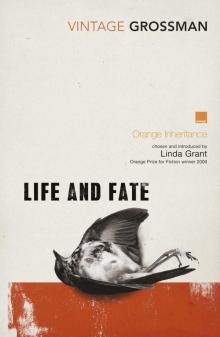 Life and Fate
Life and Fate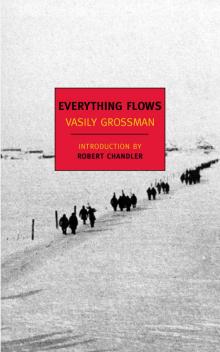 Everything Flows
Everything Flows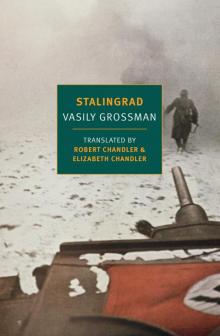 Stalingrad
Stalingrad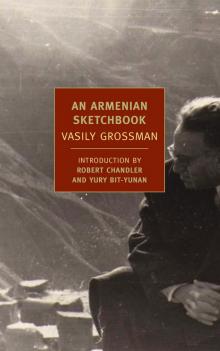 An Armenian Sketchbook
An Armenian Sketchbook The Road
The Road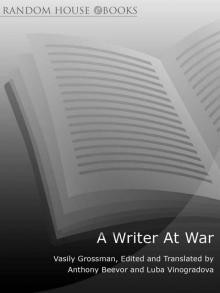 A Writer at War
A Writer at War